Being JA'Merican
Becoming a Jamaican-American, African American

When you leave a Caribbean country and travel to the USA, or anywhere else for that matter, you are expected to render a helping hand to your many relatives and close friends back home. There are usually many who will need your help if you find yourself working in any capacity. My experience had me sending a half of my measly paycheck back home every month. Luckily, I lived with my aunt and didn't have to pay rent as yet. She too was sending money back home almost every month.
The money transfer businesses like Moneygram and Western Union made a killing from people like me, and the millions who are caught up in this never-ending cycle. It never stops, there are always medical bills, brothers, sisters, cousins and Godchildren graduating from school or a friend having another baby. Parents top the list of must send money every month. Lots of folks need lots of things.
It sure is a mouthful to tell people that I am a Jamaican, naturalized American, African American, now mostly living in the USA. What an idea that is to imagine. As a young child I never dreamed that I would be living in this greatly diversified pastiche, patchwork, medley, melange and beautiful mish-mash of colorful humanity known as' The United States of America'. These were a young woman's thoughts as she pondered her life on this particular day.
The air inside the train caboose sang with the tintinnabulation of the music of voices speaking in strange languages as conversations infused the senses. The mind traveled to a thousand different lands in those few chattering moments in time, bringing back the memory of the story in the bible that my mother liked to tell. This story of the building of the tower of Babel, and how God gave everyone a different language, all because we were audacious enough to want to climb up to Heaven.
Imogen sat on the train lost in contemplation, she was thinking about how her culture could so easily become lost living in America. Everybody perks up an ear when you mention the USA. But bring up a story about your little country and nobody really pays much attention. She didn't want to lose her identity, but neither did she want to force her people's history on to anyone who was not really interested.
An argument was heating up nearby her, drawing everyone's attention to the speakers for the wrong reason, as Imogen watched the #6 train rattle and catapult by on its way back from Manhattan to Brooklyn.

"The color of the Jamaican flag is red, green and gold". Natasha, a pixie haired blond argued loudly.
"No, you are wrong. It is black, green and gold". Steven replied, a bit annoyed. He was Jamaican, how dare a Brooklynite tell him the color of his country's flag.
"Let's Google it then". Natasha insisted.

"Listen to me. I was born in the country, I may not live there right now, but at least I know the colors of the God damned flag".
"Ok, ok, so explain it then". Natasha said, still unrelenting, but backing off a bit.
" Pshaw man", said Steven, hissing his teeth in annoyance.
"The Jamaican flag uses the traditional African colors of black, green and yellow. The green means the people are strong. Black depicts the strength and creativity of the people, and Gold the natural beauty of the sunlight".
"You wrong too, young bwoy; green stand for de color of grass and de lush green landscape". A sleepy greying at the temples Rastafarian brethren stated sagely from his seat nearby.
"You right, you right, thank you brethren", Steven answered, scratching his chin and nodding his head thoughtfully.
"But the Rastafarians wear red, green and gold colors". His companion still insisted, glancing over at the dreadlocked, brightly knitted hat perched on head of the nodding passenger.
"Yes, those colors represent a group of people who are representative of a community, not of the country itself". Steven replied, as the brethren nodded his head in agreement.
"Oh, I see. I think I understand now. Thanks for the clarification". Steven sighed. Argument averted thankfully. A heated debate on the Brooklyn A train was not something which he welcomed.
Imogen thought back to her childhood all those years ago. She had listened to her cousin defend the colors of their homeland with passion and pride. She missed her family a lot. But her parents had sacrificed a great deal for her to go live with her aunt in the US. Aunt Kay never had children, so Imogen was sent to live with her and go to high school while doing so. Aunt Kay sent money home as often as she could to help with life back home. She was a kind person, but was very strict, which sometimes annoyed Imogen.
Life had not been easy back then. Her mother was a stay-at-home mom, her father a musician and carpenter. He got work when he could, they had seven children, eight if you count an older brother living in Canada, they never really knew him though. Someday soon, she hoped she would. Her mother was always helping neighbors near and far and there was always someone's child staying temporarily with the family at some point or the other.
Imogen had a lot of family scattered all over the USA, but many were distant relatives, she only met up with a few of them sometimes. Her mind drifted back to Jamaica as she remembered how much it had changed from the way her parents used to describe it to them. As soon as she started working, she too would help some of her relatives and friends in whatever way that she could. Almost everyone that she knew did that, it was somehow expected, and truly she wanted to help, the money here worked out to quite a lot back home when it is converted.
The people on the train grew quiet as it rattled homeward. It was the end of the workday, and everyone just wanted to get home.
Memories flooded back to her mind of the long, narrow meandering Jamaican country road, which starts out level and packed with dirt, then turns into a gravely pathway that curves between beautiful stretches of flowery colorful landscape. Huge trees grew against a backdrop of a sprinkle of houses and scattered areas of woodland. That is the road which leads to my grandparent's house in the country, she remembered, smiling as the memories became clearer. Imogen had been born in a little town called Marlie Hill, in the parish of Manchester, which is hidden deep in the rural Jamaican countryside. She didn't remember much about the early days, her parents moved to the city when she was much too young to have formed any lasting impression of the place.
Here her mind snapped back to one of the very few and far between trips to go for a visit. Funds were always a scarce commodity, so when the opportunity presented itself, everybody wanted to go.
"Ouch! Daisy, get off my foot, why you can't sit still child". Momma Dena gasped, as pain shot through her already aching toe.
"But momma, i'm uncomfort, three year old Daisy replied", jiggling like jelly with her little mouth pouting her unhappiness.
"Ha, ha, ha, you mean uncomfortable Daisy", her cousin Vana corrected, setting off a new phase of pouts and jiggles by the child.
"Shush everyone, we soon be there, just stop the confounded bickering". Dada hissed. Everyone falls silent when Dada speaks.
The Allyn family sat scrunched against each other inside the rented taxi car as it navigated the narrow country roads. The young children wriggled, complained and yelled, while the family prayed fervently to get to their destination. They were packed in like sardines, five people seated in the back with three younger children perched on their laps, playing 'hop a lap' with everyone. In the front two people occupied the seat which was meant for one, while a third shared the driver's seat, the driver having to reach over his passenger to change the gears. Packages and bags were distributed very randomly at everyone's feet and everywhere else, as the trunk was packed with stuff the driver hoped to sell. It was a wonder that he could see to drive properly, I prayed we didn't get pulled over.
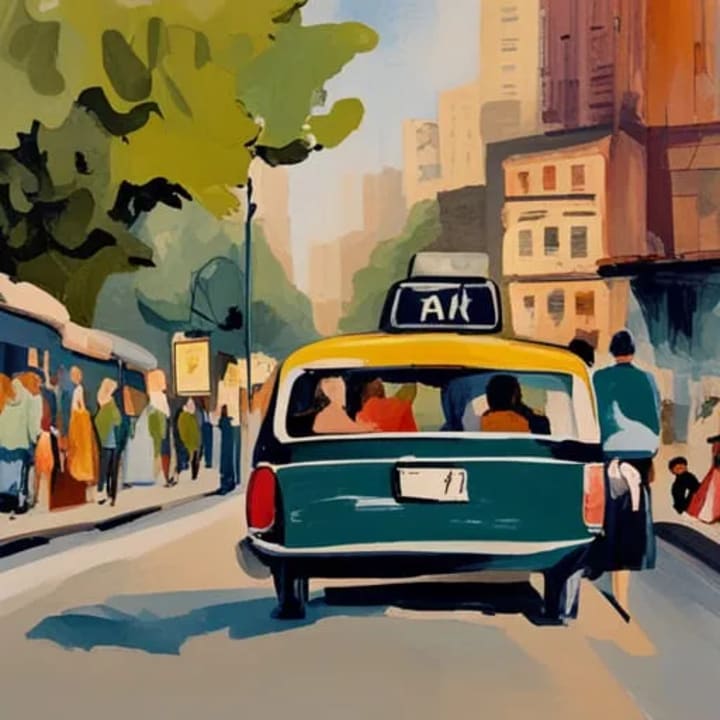
This was life in the city as well as rural Jamaica where I grew up.
I never knew my grandfather. He had been a fisherman, I was told. He loved the sea, but the sea had claimed him one dark and stormy night. He had died doing the thing he loved best. If I ever die, I had thought, it would be just like grandfather, doing what I loved. I wasn't sure what that thing was yet, but I was sure it would come to me soon.
I did know my grandmother though, a lovely, kind soul, met her when I was maybe five or six. My parents had moved from the country to the city, I never understood why. I loved the countryside on the few visits that my parents had made there. It was a long ride to get there. Why anyone would move to the city and leave all the fertile land where one could grow fresh vegetables and fruits, grind their own coffee and get buried in the family cemetery, which was almost next to the large outside kitchen, was beyond my understanding. I always wondered why the burial plot was so close to the kitchen. Maybe they expected the ghosts to still come to dinner.
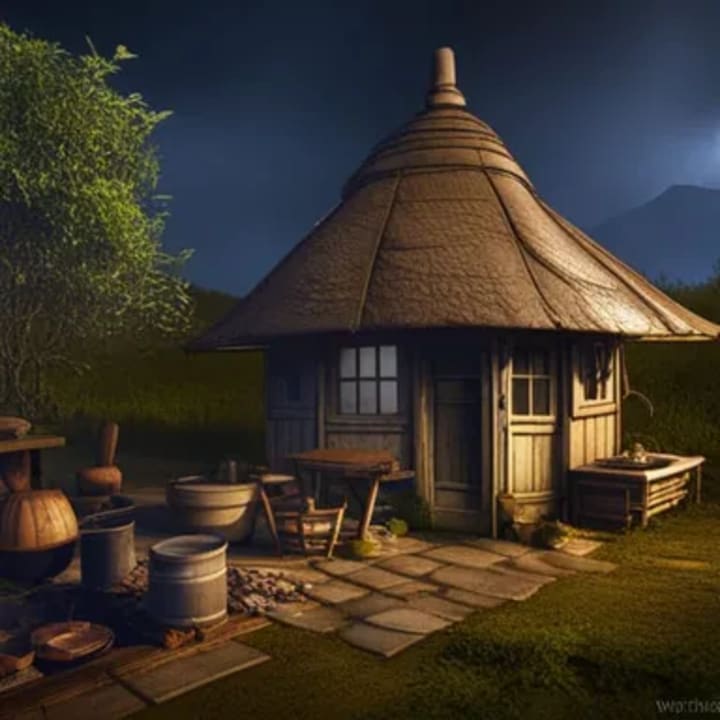
So then, even if I was dead, I would still be able to smell the delicious aroma of food wafting from the kitchen. I had to smile at the fanciful idea.
One of my aunts was buried there, Aunt Helena had died young. I think she had been murdered in a stupid fight over some stupid boy or something. I heard that she was very beautiful and never did know if anyone had been punished for it. But I am sure that the person did pay in some way, cause' there is a God to make sure of it.

At thirteen years old, my imaginative self had a way of tuning out all the noise of my family. I would concentrate on the green lush inviting vista and panoramic view of the untouched vast open countryside. I marveled at the greenery and expansive beauty of nature, unspoiled by human need for utilization of trees and things like deforestation.
The taxi left the greenery of the countryside for a while and emerged into a small winding built up section of the community. Tiny shops and stores signaled the little marketplace, before emerging again into the green and dotted countryside.

Finally, the car came to a halt, jolting me from my thoughts, we had arrived at my grandmother's quaint little country cottage. Here, there was no electricity, so everything had to get done before dark.

"They here Mother Mur". Someone yelled.
A whole trove of relatives had gathered for a cookout by the "Barbecue", so called because everything was done on this great slab of rectangular built up concrete structure which did everything from sunning coffee beans, drying meat and airing out the clothes. This was a much anticipated event, since relatives from afar rarely came to visit and bring city news of varied subjects and importance to lessen the monotony of the quiet, peaceful country life.
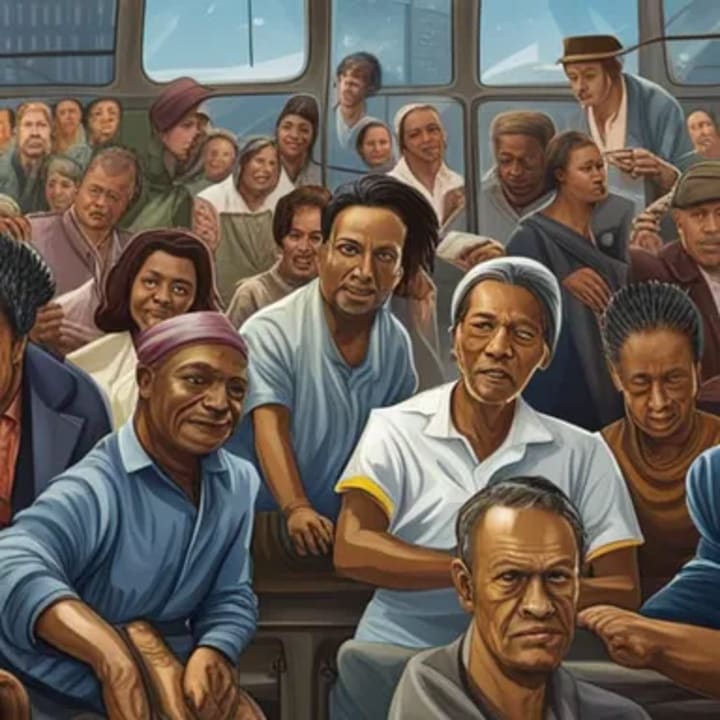
Many hugs, shaking of hands, pinching of unwilling cheeks ensued, followed by the unpacking of the happily vacated car. After hugging their grandmother, they were introduced to visiting neighbors and the cooking ingredients gathered for the great preparation of the feast. The men chopped wood, roasted fish and cooked the curried goat, which had been sacrificed for the get together. The women made the accompanying dishes and lorded it over everyone.
"How was the ride down from the city children"? Grandmother Mur enquired of the little ones.
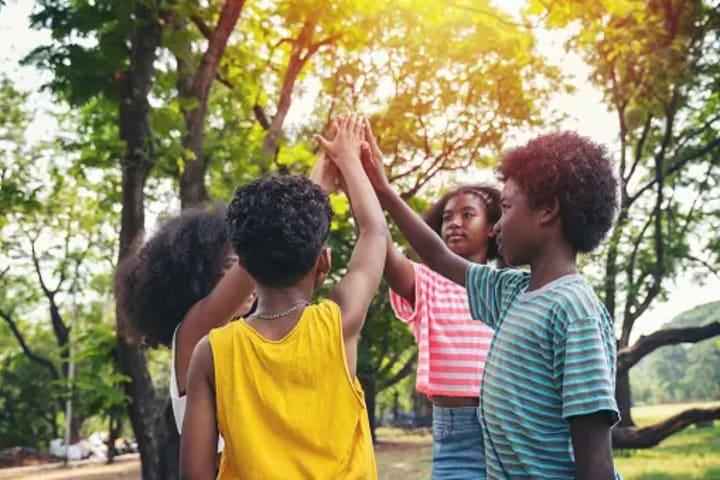
"Fine", was all she got before they chased away after the various animals that walked about peering enquiringly at the chattering, bustling humans who were invading their privacy.
"Imogen, you sure are shooting up like a tree child, but you kinda skinny. Come help with the cooking dear, You need some food in your growing body". As much as I disliked cooking, I did not dare refuse my grandmother, a stern look from Gran was worse than a good whopping.
Grandmother Mur baked bammies, the Jamaican equivalent of tacos. This was made from sweet cassava as opposed to bitter cassava and baked in a dry skillet. It was delicious, healthier than flour tacos and eaten with fried fish. Rice and peas was never better than when cooked by Jamaican mothers and grandmothers, this was served with curried goat, most people preferred it with white rice without beans. Callaloo, similar to spinach, was the staple vegetable, carrots, beet, tomatoes and other vegetables were picked from the rambling garden across from the house. One could inhale the delectable aroma of the food being cooked on charcoal and wood from a mile away. Everyone knew that food cooked in this way is three times tastier than traditional stovetop fares.
After a most delicious and filling dinner, everyone being stuffed and fully satisfied, the women and older children cleaned up and washed the dishes while the men got the remnants of firewood and ashes out of the way. Lanterns were lit outside, lamps lit inside, chairs were assembled, and it was time to relax.
The men played dominoes, the women gossiped and exchanges stories, some of the older folks, men and women, puffed away on their pipes while watching the children romp and play, wondering where the years had gone since they played like that. Time passed in quiet outdoor serenity and peace for a while.
"Story time". Someone yelled.
"First, an Anansi story for the young ones, then it is time for a history lesson". The kids clapped, as they ran over to listen, they loved Bredda (brother) Anansi tales of mischief.
How Anansi got skinny legs
"Anansi had eight fat legs once upon a time, but one day that all changed. He was a greedy spider, wanted to eat everybody's food. He visited many of his friends who were all cooking something very delicious. Anansi wondered how to eat a bit of all the food. He couldn't be in all places at once. So, he decided to spin his web, attach it to his body, and give a strand to everyone, so that when the food was ready all they had to do was pull the web, and he would come get the food.
And so, he went on his way, skipping along just waiting for food from all of his hard-working friends, while he idled his time away down by the river.
Unfortunately for Anansi, when the food was ready, everybody started pulling the web at the same time. The strong silk of the web squeezed and pulled, his eight legs got thinner and thinner until he fell over. He was tied up for so long, with no one in sight to help him up, that he missed all the food. Finally, he got himself loose and went home to eat dried bread and water. That is why Anansi has skinny legs as they never got plump ever again.
Anansi was a bad, greedy spider, the moral of the story children, don't be greedy". Aunt Dora concluded the story.
"I won't be greedy, I don't want skinny legs". Laughed Ava, as all the kids laughed along with her.

Ralph, the school teacher was nominated for History night. Ralph groaned but did not object. History was his favorite subject. He hefted his legs onto a large nearby stone, leaned back in his chair, folded his arms and looked off into the fast approaching night sky, while he began his story telling.
"Back in the beginning, the little Caribbean island of Jamaica was populated by people called Redware who also made Redware pottery. Little is known of them beyond the red pottery they left behind, and that they lived near here in Alligator Pond, where they hunted turtles and fish.
The Arawak tribes, came next, then Columbus arrived in 1494. As the early inhabitants of Jamaica, the Arawaks, named the land "Xaymaca", meaning "land of wood and water". The Spanish people came and enslaved the Arawaks, many died from diseases that the Spanish brought with them. By 1602, the Arawak tribes were almost extinct. However, some of them escaped into the forested mountains where they mixed with runaway African slaves, and survived free from the Spanish and English rule".
"Hold on a minute, little children sleeping now, we going put them to bed and come back, come Dena. No story till we come back now, I want to hear every'ting", Gran ordered.
The women returned and Ralph continued his story.
"Spanish slave traders captured and transported hundreds of our West African ancestors to the island for the purpose of slavery. Afterwards, the majority of Africans were brought into Jamaica by the English when they invaded the island in 1655 and defeated the Spanish.
Piracy
Many of our enslaved people took advantage of the political turmoil and escaped to the island's interior mountains, forming independent communities which became known as the Maroons. Meanwhile, on the coast, the English built the settlement of Port Royal, a base of operations where piracy flourished. Captain Henry Morgan was one of the richest pirates in the Caribbean".
"Yes, I want to learn more about the pirates, I want to be a pirate and sail the seas like my grandfather, ahoy, ahoy matey". Piped in Cala.
"Hush child, your grandfather wasn't a pirate, he was a fisherman", Dada chuckled with everyone laughing along.
"Well, by the 1670s and 1680s, Morgan – in his capacity as an owner of three large plantations – led three campaigns against the Jamaican Maroons. Morgan achieved some success against the Maroons, who withdrew further into the Blue Mountains, where they were able to stay out of the reach of Morgan and his forces.
Morgan failed in his attempts to capture the community of runaway slaves. By the time Morgan died, he owned three plantations which held captive large numbers of African people as slaves". Here Ralph paused in his narrative.
"Just making sure you all not fast asleep". He said jokingly, looking around.
"Bathroom break". Dada called. Everyone took turns, stretched their feet and did their odd this and that, then returned for the end of the history lesson.
Sugar cane
"During the 18th century, sugar cane replaced piracy as Jamaica flourished under British rule. As sugar became the main source of income, they needed many workers. The British brought hundreds of thousands of enslaved Africans to the island. Jamaicans slaves mounted over a dozen major uprisings during the 18th century, including Tacky's Revolt in 1760, and skirmishes between the British and the mountain communities of the Jamaican Maroons.
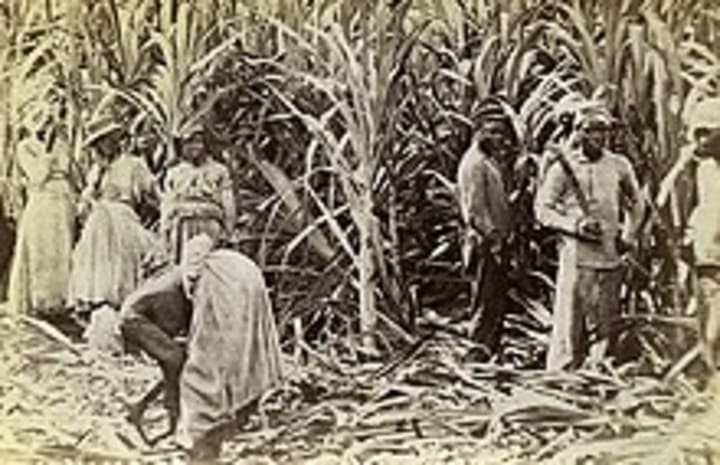
After so many uprisings and wars, the conditions of slaves were highlighted and this contributed greatly to the abolition movement and the passage of The Slavery Abolition Act of 1833, this formally ended slavery in Jamaica in 1834. Relations between the white and black community remained tense coming into the mid-19th century. This situation notably led to the Morant Bay Rebellion in 1865 and economic decline, low crop prices, droughts, and disease followed.
Sugar lost its importance, and many former plantations went bankrupt, the plantation lands were sold to Jamaican laborers and farmers and cane fields were consolidated by dominant British producers".
"Amen to that, 'bout time our people started to own something". Gran said, yawning.
"Jamaica's political parties, workers association and trade unions emerged in the 1920-1930s. A new Constitution in 1944 allowed men to vote, and limited self-government eventually led to Jamaican Independence in 1962 with Alexander Bustamante serving as its first prime minister".
"Why women couldn't vote too was such a stupid ting, always be thinking men better than us women folk even now". Auntie Lena was always the voice of 'women for equality'. She was my favorite aunt by far.
"The country grew and relied less on the agricultural sector and more on bauxite and mining in the 1960s and 1970s. Political changes occurred between the two dominant parties, the JLP and PNP, from the 1970s to the present day. Economic troubles hit the country in 2013, the IMF agreed to a $1 billion loan to help Jamaica meet large debt payments, making Jamaica a highly indebted country that spends around half of its annual budget on debt repayments".
Ralph's story concluded to a bitter sweet silence, broken a few minutes later by the question-and-answer session.
"But why can't we make our own money, why do we have to borrow from foreign countries"? I had to ask.
"Countries can print their own money to pay off their debt, but it’s not that simple. Printing more money can lead to inflation, which is when the value of money decreases and prices increase".
"But doesn't borrowing seem just as bad. They still have to pay back the money, and the country and the people will still be poor".
"You are wise for your years Imogen, the idea of simply canceling its debt by printing more money may seem like a sound attractive idea, but it is one that would have seriously adverse consequences".
"What dat mean, explain it simple, I don't have highfalutin' education like you". Mass Green grumbled, making everyone laugh again.
"Many may suggest that money be created by the central bank and be used to finance government spending. Thinking it a good thing. A country that issues its own currency can never run out and can never become unable to pay its own debt. It can make all payments as they come due. Therefore, there is no risk of defaulting or owing on its debt".
"That sounds like common sense, why is there a 'but' coming after you say that then", Dada asked.
"Because this is not true. What happens is that when the government wants to spend more money than it raises in tax revenue, it needs to borrow money". Ralph tried to explain.
I furrowed my brow, still not quite understanding the point.
"So, in order to keep the economy from collapsing, they have to keep it going, while they borrow money which they have to pay back"? Ralph explained.
All of this didn't make sense to the highly intelligent child. Maybe when she got older and read some more she would get it, she thought.
"To avoid something called hyperinflation, which will make the dollar value less, countries try to maintain inflation below 2%. Printing their own money can lead to high inflation which will decrease the value of the country's money and increase prices".
"But won't price increase anyway in order to pay back the debt"? Calvin broke his silence to ask.
Everyone became lost in thought. Most of the people had just listened and nodded, not understanding fully, but getting the gist of the conversation, some of the older folks had nodded off.
"Why is there so much crime on the news all the time Dada, I don't understand". Imogen's younger brother Cala, two years her junior asked after the end of the story.
"It is not just in Jamaica that there is violence and crime my child, it is all over the world, our island is tiny compared to other places, but yes, there seems to be more than there should be. Times are hard and people are finding it hard to survive a lot of the time".
"Still, there shouldn't be crimes, people should learn to get along with each other", Cala replied, still not pleased with this answer.
"From the mouth of babes". Chimed in Rasta, the taxi driver.
"Quit so, quite so". Mused Uncle Calvin, who sat nearby.
Uncle Calvin had lived in England for a long time. Back then only men were sent to England to work, not women. A woman had broken his heart and he returned home a different man they said. He took to working the fields with a vengeance, producing his own crops splendidly, working from dawn to dusk. He spoke very little, was a tall and extremely handsome man whom the ladies eyed coyly. But he had been done with women, never giving a single one the time of day.
Finally, with a lot of yawning on everyone's part, the relatives and neighbors bid goodnight. Tomorrow was going to be a big day. Everyone would be working in the fields helping to reap the crop for market. A good night's sleep was highly anticipated.
The family would have fresh vegetable for their return trip to the city. Even the uncomfortable taxi ride would be a little bit more tolerable.
Imogen had written her first chapter by remembering the past. Now she had to look ahead to begin her new journey, a forage into intertwining the old with the new and forging ahead.
..........................................................
This is for the 'Next great [American] novel' challenge.
About the Creator
Novel Allen
Clouds come floating into my life, no longer to carry rain or usher storm, but to add color to my sunset sky. ~~ Rabindranath Tagore~~
Enjoyed the story? Support the Creator.
Subscribe for free to receive all their stories in your feed. You could also pledge your support or give them a one-off tip, letting them know you appreciate their work.
Reader insights
Outstanding
Excellent work. Looking forward to reading more!
Top insights
Expert insights and opinions
Arguments were carefully researched and presented
Eye opening
Niche topic & fresh perspectives
Heartfelt and relatable
The story invoked strong personal emotions
Compelling and original writing
Creative use of language & vocab
Excellent storytelling
Original narrative & well developed characters
On-point and relevant
Writing reflected the title & theme






Comments (6)
I didn't know you were Jamaican. At least I know what the Jamaican flag looks like, lol. I enjoyed your story so much.
Very interesting. ☺️👏 Much “homely” true to life storytelling Novel. Is some of this based on your experiences? Can you also remind me which challenge this was for. 😊
I am so impressed with the selflessness and beautiful sense of community that you captured here! I loved learning more about your country of origin and its beauty, traditions and history! What a delightful read! You really have a knack for writing historical fiction! I also loved the vibrant and soulful images that you chose to accompany your piece! They were heartwarming! I can see this story turning into a prize winning novel! Bravo Novel! This was a stunning piece of literature!
My Talented Friend: I knew you could do it! You crafted a world that was rich with beautiful people and histories. Imogen and Steven and their life journeys represented by the #6 train captured my imagination. I was right there with them and you. BTW, I loved the inclusion of the Tower of Babel history. Something tells me that we both deeply understand it. So many colorful threads were woven here, as vibrant as the colors of your opening picture. The travel to the Barbecue and sugar cane fields, the generations of storytellers and listeners, the hopes and dreams of generations all wrapped me in love and struggle, but mostly love. KUDOS, NOVEL!!! This was magnificent!!!
Oh I was so pleasantly surprised that you included a story of Anansi! I learned so much today from your writing!
Ya I love Jamaican cooking. An old roommate was a great cook but hard to live with as he was a narcissist. It is interesting to learn about these cultures